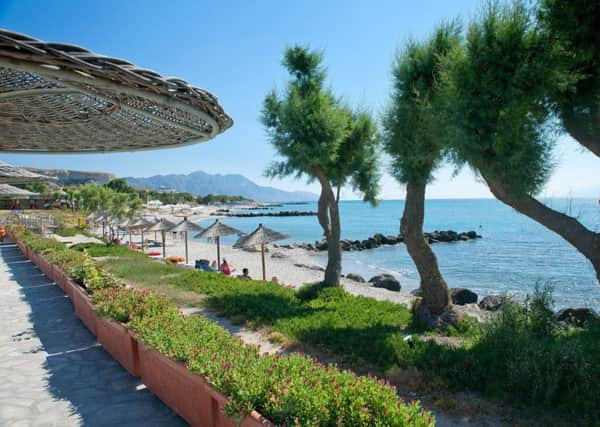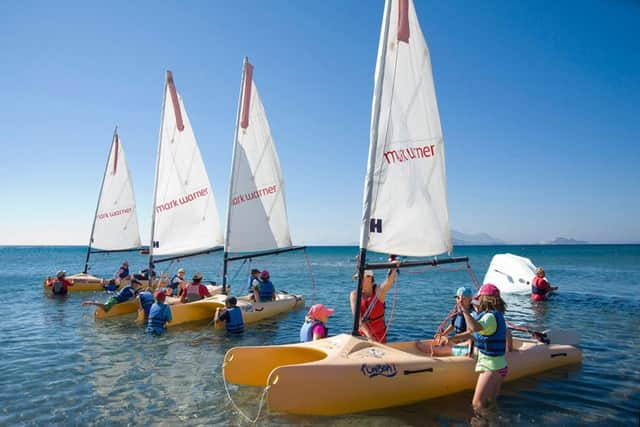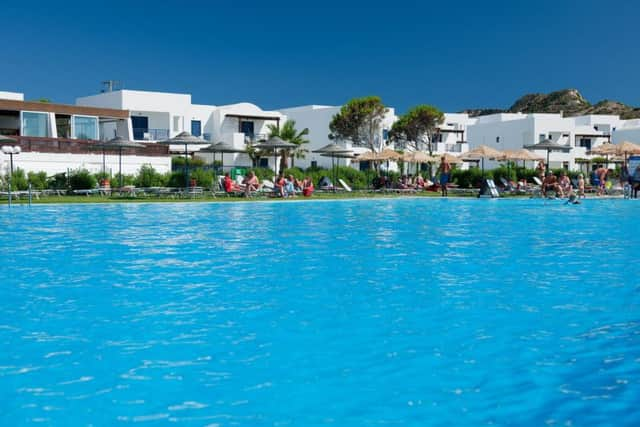Travel: A brief respite from reality at Kos


OUR journey to the island of Kos in Greece has been less fraught than for the many who have arrived here from Syria, travelling via a myriad of illegal routes in the hope of asylum in mainland Europe.
Yet, like the migrants who are risking all to build a new life, my family too is on an escape mission of sorts, although a less obviously perilous one than that of the refugees.
Advertisement
Hide AdAdvertisement
Hide AdMy hope is for my young family to enjoy a “normal” holiday – free from the shadow of my multiple sclerosis, which is enveloping us.


It seems my dream is coming true. Two kids are laughing and giggling by the poolside, faces obscured by baseball caps, the blue Aegean Sea stretching behind them towards Turkey. Cats yawn nearby in the sunshine. There is no sign of the asylum seekers. Truth be told, we would never know of their existence, save for what we later read in the press back home.
Next to the pool are bougainvillea, hibiscus and oleander, plants I’ve seen previously only in glasshouses in the UK. They thrive in the open here in Greece, rather like us holidaymakers, who have escaped our usual confines as well.
These children seem to be so happy that for a moment I have to stop and look again to check they’re really mine. My two girls have acquired a habitual look of boredom, alternating with anxiety. I saw it in their eyes at Heathrow as I was helped into yet another wheelchair.
“It’s just my MS,” I reassured them that day, while being wheeled through miles of airport walkways. “No need to worry.”


They didn’t look convinced that all was well. And I couldn’t blame them. I wasn’t sure myself how I would cope on holiday. Not with my MS coming along too.
Sadly, I’m far from being the only parent with the predicament of caring for young children while battling the condition. Around ten thousand of us here in Scotland are living with the illness, which at its worst can lead to blindness, paralysis and memory loss.
I’m grateful that I’m not suffering those symptoms at the moment (although I have done in the past), but energy is limited; I can’t walk far.
Advertisement
Hide AdAdvertisement
Hide AdAt last, the children at the pool turn round, shading their eyes from the sun; I recognise my two girls under the baseball caps. They shriek again. “Look, Mummy, look! We are jumping in the water.”
My heart fills with happiness and pride. As recently as two months ago, the younger needed to hold hands with someone else before venturing into a pool.
Now she wants to celebrate her new-found ability to jump in unaided. We try to slap hands together in jubilation. Mine is so wobbly that I almost miss. “We can do better than that,” she yells. “Come on.” We repeat the high five, slapping hands together with a resounding smack.
Seeing my children enjoy themselves, I’m aware of how lucky I am, which might sound like a contradiction in terms when writing about my condition. But for many years women like me were advised against having children. Childless and ill, that was the fate sadly awaiting too many of us. Today the illness is no longer considered the barrier to family life it once was.
But managing to entertain, educate and keep my children safe is a worry when MS blinds me (occasionally) and flattens me with exhaustion (all the time) – even on the “good” days when I can just about see properly and walk without sticks.
An early clue that this place might offer some kind of respite comes from the name of the airport: Hippocrates. That has to be a good sign, naming the airport after the father of modern medicine.
Our girls are soon happy here, hanging out with other children and learning to sail. The younger becomes engrossed in learning to tie knots. Sitting on the sand under the shade of a finikas tree, she is the picture of rapt concentration as small fingers push rope behind and through a loop.
For the first time in years I get to have breakfast with my husband, just the two of us. We sit outdoors under the shade of an olive tree in the early morning sunshine. MS? That’s stayed at home in Scotland as far as I’m concerned.
Advertisement
Hide AdAdvertisement
Hide AdLater that day, while our children are learning to tack, steer and navigate in their quest to become infant mariners, my husband and I go swimming together in the sea.
I have to hold my husband’s arm to walk across the beach to the sea. He doesn’t seem to mind, and, for once, neither do I.
Nobody needs to help me when I’m in the sea, drifting in the ocean to the sound of children’s laughter from the resort. Our kids are happy and safe, learning to sea-bob and kayak.
Weightless and peaceful, I really do forget that I even have this stupid illness. And for a time I’m free, unaware of my limitations. I lie back, looking up at the azure sky. Floating. At peace. I have succeeded in escaping my MS, or so it seems.
It’s only when I stagger as I haul myself out of the sea, moisture dripping down my nerve-damaged back, that I remember – oh, yes, that’ll be the MS at work. But at least now I know, just like the refugees fleeing their own conflicts, that escape from a personal demon is possible here. This is a place where it’s OK to forget about illness – for a while. Hippocrates, one senses, would have approved.
• Mark Warner offers holidays in Lakitira Beach Resort on Kos in Greece starting from £570 per person, half board for seven nights. The price includes flights, accommodation, resort transfers and childcare for children older than two. Flights are available from Glasgow and Heathrow. Visit www.markwarner.co.uk/sun-holidays/greece/Lakitira; www.markwarner.co.uk/family-holidays